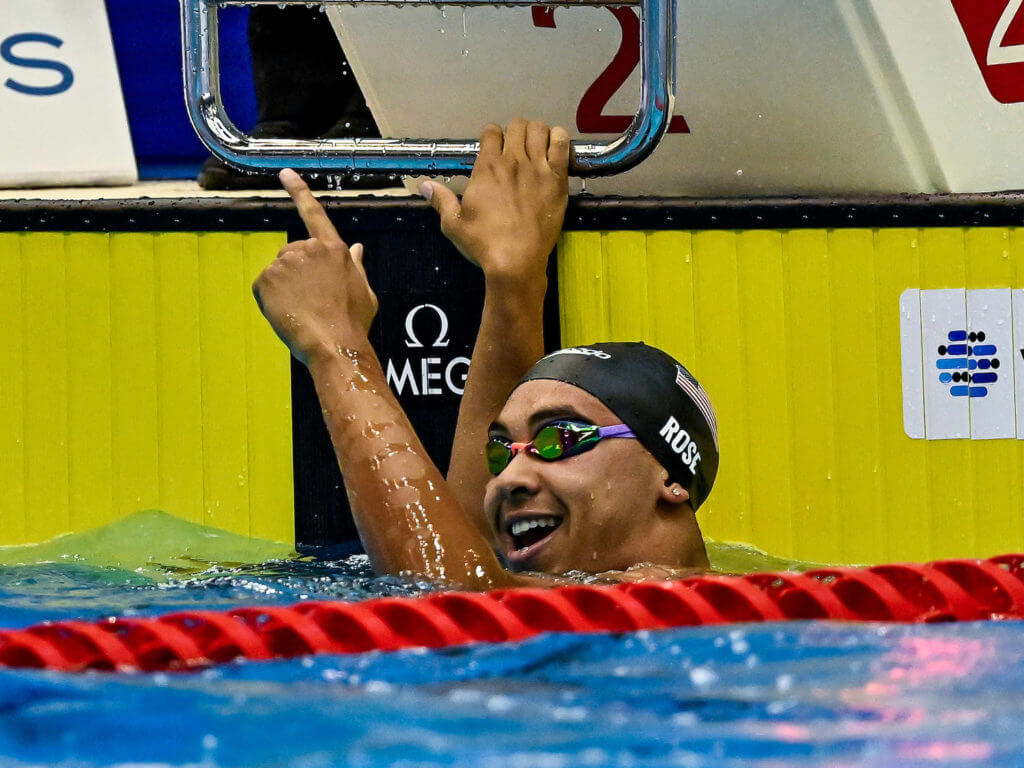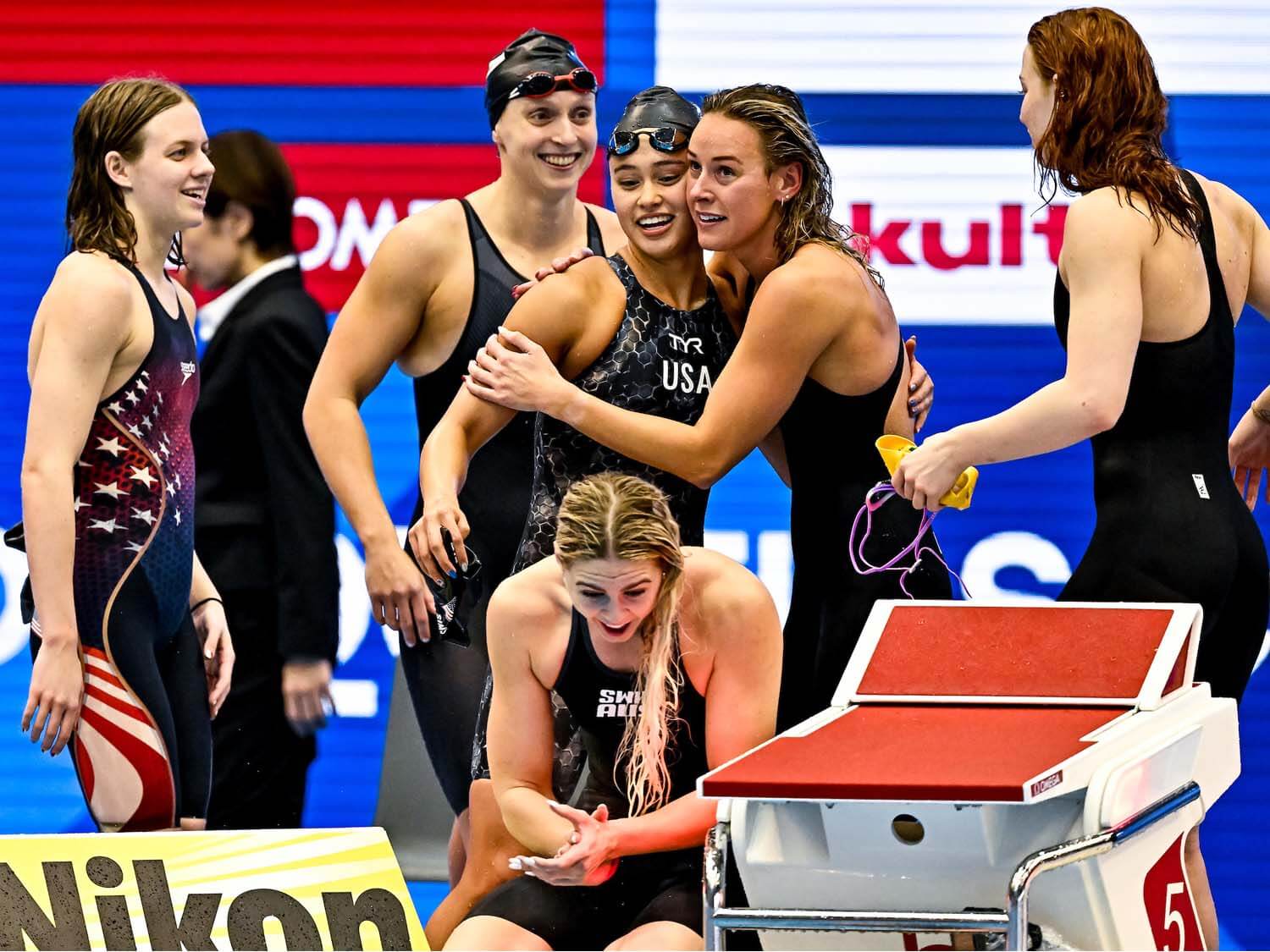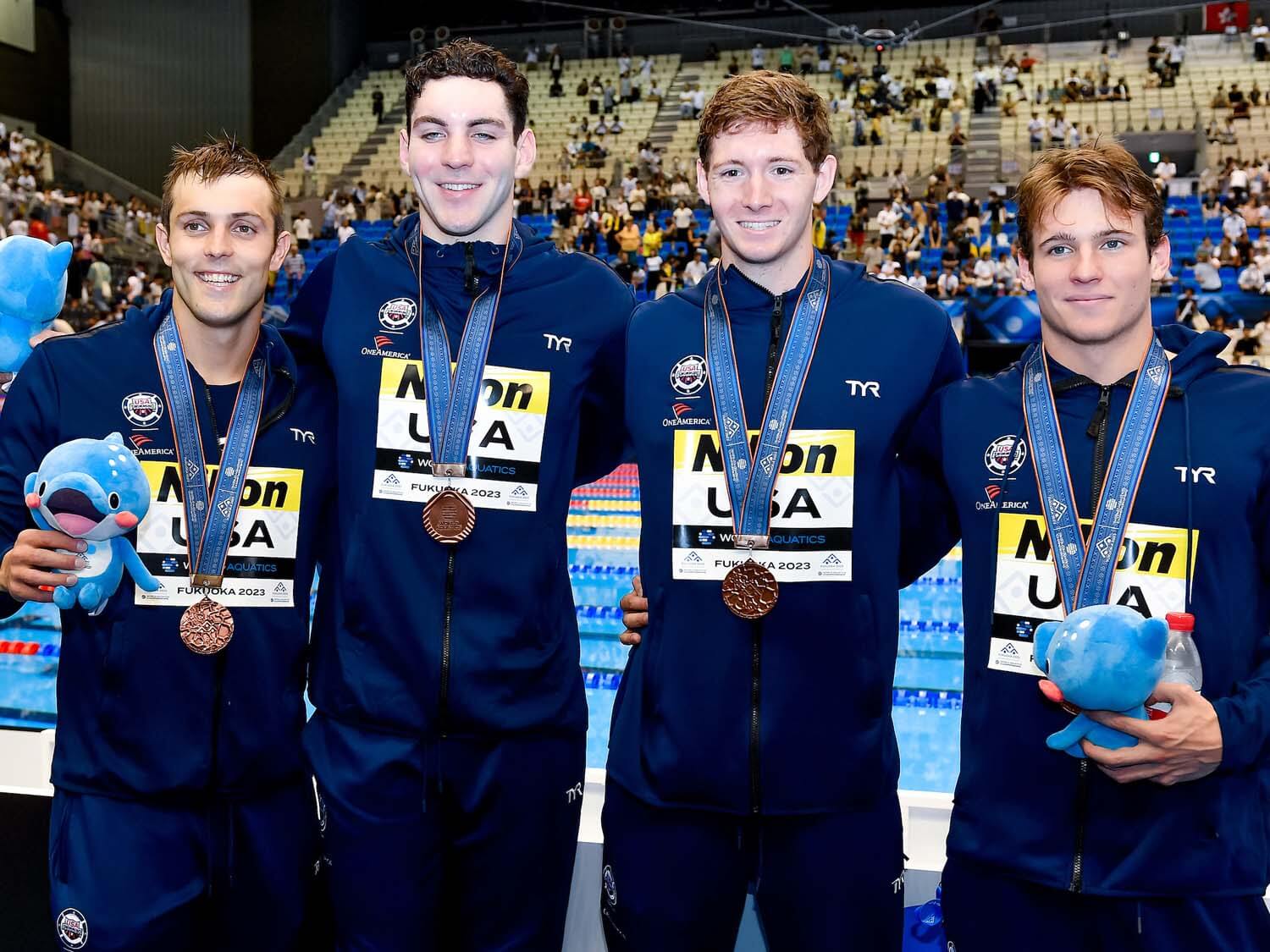American Medal Collection Gives Plenty to Build On as Paris Olympics Beckon

Editorial content for the 2023 World Aquatics Championships is sponsored by FINIS, a longtime partner of Swimming World and leading innovator of suits, goggles and equipment.

American Medal Collection Gives Plenty to Build On as Paris Olympics Beckon
Barring a stunning finish to the World Championships Sunday, the United States will finish the meet with its smallest total of gold medals since winning only four at the 1994 World Championships. Currently, the Americans have captured only four, with Katie Ledecky’s victory in the 800 freestyle ending a three-day golden drought after Ledecky (1500 free), Kate Douglass (200 IM) and Ryan Murphy (100 backstroke) were golden during the front half of the meet. An often-frustrating performance in Fukuoka has seen American swimmers repeatedly fall short of their season-best times in finals while top rival Australia has been a dominant force, capturing 13 gold medals already, punctuated by three more Saturday evening.
That’s one angle on the U.S. performance this week. But also consider that the Americans have found a way to reach the podium far more often than not. In six finals Saturday, each produced an American medal: in addition to Ledecky’s gold, Jack Alexy (men’s 50 free) and Regan Smith (women’s 200 back) captured silvers while Dare Rose (men’s 100 butterfly) and Gretchen Walsh (women’s 50 fly) earned bronze, with the mixed 400 free relay team also taking silver. Australia, in comparison, won three gold medals on the night but only four total medals overall.
The U.S. team has collected 31 medals already, with a solid chance at five to eight more on the final day of competition. The team won’t match last year’s total of 45, which was inflated as many of the world’s top swimmers skipped the meet, but the American overall tally has already surpassed their results at World Championships in 2019, 2015 and 2013. Reaching the 38-medal total from 2017 is attainable, although not a guarantee.
Judging a country’s success based on number of gold medals or based on number of overall medals typically produce the same winner but not this year, not even close when considering Australia’s massive 13-to-4 lead in gold medals, with China also sitting ahead of the Americans (five) while 31 American medals is well clear of Australia’s 20. The traditional method of assessing dominance is gold medals, so give this meet to Australia: a dominant meet all-around, with Mollie O’Callaghan and Kaylee McKeown each owning multiple golds and the abilities of Ariarne Titmus and Kyle Chalmers unquestioned.
But Fukuoka was no lost cause for the Americans. Actually, the abundance of silver medals (16) and bronze medals (11) gives the team plenty to build on while looking ahead to the competition most prioritized, the Paris Olympics. The lack of wins turned into an acceptable result when young swimmers riding a strong improvement track still managed to reach the podium while getting their first sense of what international racing looks like.

U.S. swimmers Erin Gemmell, Katie Ledecky and Bella Sims congratulate the Australian women after the 800 free relay final — Photo Courtesy: Andrea Masini / Deepbluemedia / Insidefoto
“I think we’re doing pretty well,” Ledecky said Saturday. “I know we’re not getting a lot of golds, but we’re getting a heck of a lot of silvers. It’s a really young team, and the things I’m hearing at the lunch table and dinner table, people are learning a lot, and that’s what you love to see and love to hear. People like Jack Alexy, I don’t think any of you guys knew who he was. I barely knew who he was until Nationals. For him to come away with all these medals, to just keep getting better, people like him are gaining valuable experience.
“I know we’re all really motivated. We want to do better. We want to be better next year in Paris. I think we’ll continue to encourage each other, this team and then a lot of people back home who are really hungry that they didn’t make this team. We’ve got a really good crop of swimmers, young and veterans that will continue to push each other.”
The lack of wins turned into an acceptable result when young swimmers riding a strong improvement track still managed to reach the podium while getting their first sense of what international racing looks like.
“That’s definitely going to be the main takeaway,” Matt King said after racing on his second medal-winning relay of the meet. “Growth, time-wise, I don’t think I improved a lot, but mentally I think I definitely improved from day one to day seven or whatever day this is. That’s definitely going to be my main takeaway from this meet, the mentality of it all, having those days off in the middle where I have to figure out what to do, how to stay in shape when I’m not swimming a lot.”
Looking through the American results this week, Alexy is surely a bright spot after he rebounded from a disastrous start in the 100 free semifinals to qualify for the final in the eighth position and then win silver from an outside lane, a fast finish in the splash-and-dash netting him a second individual silver two days later. All this from a man considered perhaps a relay contender entering Nationals.
Rose was not on the radar in mid-June, but now, he has cut almost one second from his lifetime best between Nationals and Worlds, reaching the podium in the individual event but also shoring up the butterfly leg of the U.S. men’s 400 medley relay. Matt Fallon was a known quantity entering Nationals, but he won the first American medal in the men’s 200 breast at the Worlds or Olympics since 2016.
Indeed, the Americans have captured medals in all but six Olympic events so far, and in three of those events, the top U.S. swimmer placed fourth. In the men’s 200 fly, Carson Foster faded to sixth but Thomas Heilman surged into a tie for second. Shaine Casas and Foster placed fourth and fifth, respectively, in the 200 IM. Douglass was just a tenth off the podium in the women’s 100 free. Additionally, Luke Hobson broke 1:45 for the first time in the men’s 200 free before placing fifth in a fast final while in the women’s equivalent event, with Ledecky no longer racing the individual 200 free internationally, Bella Sims placed sixth.
That leaves only one glaring hole on the Americans’ roster, in the men’s 400 free, where Kieran Smith was the top finisher in ninth place. Other than that event and the aforementioned women’s 200 free, there is a logical and realistic American path to the podium in every single race for next summer’s Paris Olympics, the sort of roster breadth that any other nation envies.
The women have been in this position for a few years, with the 10 teenagers that raced for the Americans at the Tokyo Olympics comprising a core of athletes poised to lead through the ensuing shortened Olympic cycle. That has transpired, with the likes of Douglass, Regan Smith, Alex Walsh, Torri Huske and Lydia Jacoby among the no-longer-teenage swimmers to capture individual medals in Fukuoka. But on the men’s side, that next generation is now starting to take shape, and they will be better in 2024 thanks to their experiences in 2023.

U.S. swimmers Ryan Held, Jack Alexy, Chris Guiliano and Matt King after winning bronze in the 400 free relay — Photo Courtesy: Andrea Masini / Deepbluemedia / Insidefoto
Among the biggest lessons for the young American group: remember to be persistent during this lengthy, high-pressure competition. Over eight days, swimmers have to manage the emotional waves that come with any championship meet and make sure that one bad swim does not mean the end or failure of a meet. That will be even more critical next year in Paris as the racing schedule expands to nine days for the first time.
“It’s just important to remember that it’s never going to be perfect, and it’s so important to roll with the punches and just keep going,” Smith said. “I wasn’t pleased with all of my swims this week, but it’s so important to just keep going and remember that I’m swimming for something bigger than myself. You don’t want to get too down in the dumps on any one race, any one swim.
“Just kind of pick yourself up kind of quickly because you’ve got to remember it’s not just about you, it’s about this entire team. And I think that really helps get you in a better space mentally and allows you to bounce back quicker than you maybe could’ve if you were just swimming for yourself.”
Nevertheless, the United States still only has four gold medals, none of them on relays. Those totals probably will change during the final day of competition but not sufficiently for the U.S. coaches and swimmers to be fully satisfied with their overall performance. Australia was the dominant team here, knocking the U.S. from the top spot after two uninterrupted decades. Surely, that’s not a position in which USA Swimming leadership would like to end up next year.
So coaches and leadership must use Fukuoka as a learning experience. The wide spread of medals means this is not a start-from-scratch situation, but figure out what works and what needs to change in time for Paris. Refine training and taper plans, and start considering how to improve team chemistry to build the cohesive teams that seemingly never miss on the Olympic stage.
This week’s American performance should not be wasted. The pieces, both inspiring and lackluster, can coalesce into something superior in time for Paris.


- MEET HOMEPAGE
- COMPETITION SCHEDULE
- ENTRY LISTS
- 2022 WORLD CHAMPIONSHIPS
- LIVE RESULTS
- DAY 1 PRELIMS RESULTS
- DAY 1 FINALS RESULTS
- DAY 2 PRELIMS RESULTS
- DAY 2 FINALS RESULTS
- DAY 3 PRELIMS RESULTS
- DAY 3 FINALS RESULTS
- DAY 4 PRELIMS RESULTS
- DAY 4 FINALS RESULTS
- DAY 5 PRELIMS RESULTS
- DAY 5 FINALS RESULTS
- DAY 6 PRELIMS RESULTS
- DAY 6 FINALS RESULTS
- DAY 7 PRELIMS RESULTS
- DAY 7 FINALS RESULTS
- DAY 8 PRELIMS RESULTS
- DAY 8 FINALS RESULTS




‘It’s not about you, it’s about something bigger’ (the team). What rubbish. It’s you that does the training and deserves the medals. Why does swimming have to be plagued like team sports? It’s an individual sport. Tennis doesn’t have a medal table! Take all the relays and have a championships just for those if tribalistic guff is important to you!